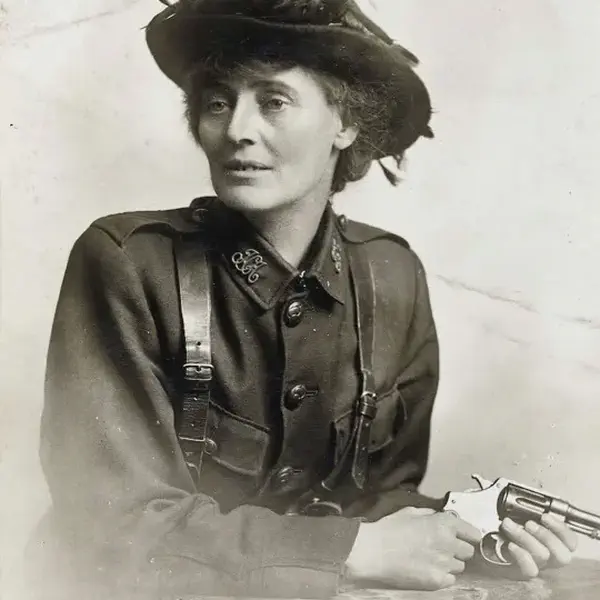
Countess Constance Markievicz, Irish Patriot and Revolutionary, Born
February 04, 1868
Constance Georgine Markievicz (Polish: Markiewicz [marˈkʲɛvitʂ]; née Gore-Booth; 4 February 1868 – 15 July 1927), also known as Countess Markievicz and Madame Markievicz, was an Irish politician, revolutionary, nationalist, suffragist, socialist, and the first woman elected to the Westminster Parliament, and was elected Minister for Labour in the First Dáil, becoming the first female cabinet minister in Europe. She served as a Teachta Dála for the Dublin South constituency from 1921 to 1922 and 1923 to 1927. She was a Member of Parliament (MP) for Dublin St Patrick’s from 1918 to 1922.
Constance Georgine Gore-Booth was born at Buckingham Gate in London in 1868, the elder daughter of the Arctic explorer and adventurer Sir Henry Gore-Booth, 5th Baronet, an Anglo-Irish landlord who administered a 100 km2 (39 sq mi) estate, and Georgina, Lady Gore-Booth, née Hill. During the famine of 1879–80, Sir Henry provided free food for the tenants on his estate at Lissadell House in the north of County Sligo in the north-west of Ireland. Their father’s example inspired in Gore-Booth and her younger sister, Eva Gore-Booth, a deep concern for working people and the poor.
Countess Constance Markievicz, born Constance Georgine Gore-Booth in 1868, was a prominent Irish revolutionary, suffragette, socialist, and the first woman elected to the British Parliament, though she did not take her seat, aligning instead with the Irish republican cause. She was a key figure in the early 20th-century struggle for Irish independence and women’s rights.
Constance was born into an Anglo-Irish aristocratic family but was deeply moved by the plight of the working-class Irish and became politically active in nationalist movements and the campaign for Irish independence. Her political activism was influenced by her time in London, where she studied art, and later in Paris, where she met her husband, Casimir Markievicz, a Polish count.
Markievicz is best known for her role in the 1916 Easter Rising, a key event in the struggle for Irish independence. She was a member of the Irish Citizen Army and fought at St. Stephen’s Green in Dublin during the Rising. For her involvement, she was arrested and sentenced to death, but her sentence was commuted to life imprisonment due to her gender; she was released in 1917 as part of a general amnesty.
In the 1918 general election, Markievicz was elected as a member of parliament (MP) for the Sinn Féin party in the Dublin St Patrick’s constituency, making her the first woman elected to the British House of Commons. However, in line with Sinn Féin’s abstentionist policy, she did not take her seat, instead serving in the First Dáil, the revolutionary parliament of the Irish Republic.
Throughout her life, Markievicz was dedicated to the Irish cause and the welfare of the working classes, also focusing on issues of women’s rights and social justice. She served as the Minister for Labour in the First Dáil from 1919 to 1922, becoming one of the world’s first female cabinet ministers.
Constance Markievicz died in 1927 in Dublin, remembered as a pioneering figure in Irish history for her role in the fight for independence and her breaking of gender barriers in politics and society.